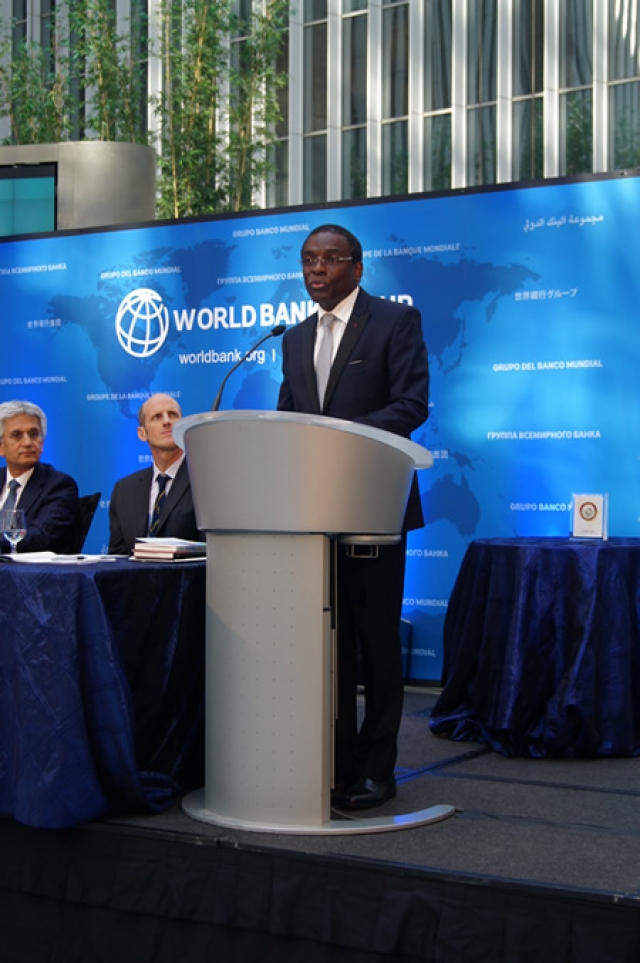Dr Luis Sambo lauds success of river blindness control and urges renewed commitment to tackle neglected tropical diseases in Africa
 Washington DC/Brazzaville, 20 June 2014 -- The World Health Organization Regional Director for Africa, Dr Luis Gomes Sambo has commended private-public partnerships, country leadership and community directed interventions for their crucial role towards the elimination of river blindness (Onchocerciasis) in the African Region.
Washington DC/Brazzaville, 20 June 2014 -- The World Health Organization Regional Director for Africa, Dr Luis Gomes Sambo has commended private-public partnerships, country leadership and community directed interventions for their crucial role towards the elimination of river blindness (Onchocerciasis) in the African Region.
Dr Sambo was speaking at an event in Washington DC, USA organized by the World Bank to celebrate the success of the 40-year partnership of the World Bank's Africa Region, WHO, Merck & Co. Inc., and other agencies in addressing the major socio-economic and public health challenge posed by river blindness.
He said: “The long-term and sustained support of donors and partners to Onchocerciasis Control Programme (OCP) and the African Programme for Onchocerciasis Control (APOC) resulted in millions of children and rural populations being freed from blindness, skin disease and unrelenting itching due to river blindness. In short, normal life and socio-economic development had restarted in these areas”.
The partnership has freed up 25 million hectares of previously uninhabitable arable land. The control of river blindness has also contributed to harnessing individual potential and socio economic development of the affected countries.
The Regional Director pointed out that the achievements of these programs led to African health Ministers agreeing to expand the mandate of APOC to cover Lymphatic filariasis (also known as elephantiasis) and contribute to control of other neglected tropical diseases (NTDs) during the period 2016-2020. Furthermore the APOC governing body approved the creation of a new entity: “The Programme for the Elimination of Neglected Diseases in Africa – PENDA” that is expected to have a broader mandate.
“The success of PENDA will depend on renewed long-term commitment and concrete support of the international community to national and global NTD efforts”, said Dr Sambo, emphasizing that a solid support mechanism is required to carry out this new relevant vision. He called for collective responsibility of the private sector, civil society, communities, Governments of recipient countries and a broader partnership to move from declarations to concrete actions.
“The world has the means to alleviate poverty through the reduction of the NTDs burden that affects mostly the poor people living in the tropics and subtropical areas. It is socially fair, technically feasible, financially affordable and politically commendable”, said the WHO Regional Director for Africa.
It is estimated that about 300 million USD a year is needed to control NTDs in Africa by 2020.
River blindness disease particularly affected the communities of the savanna region of West Africa and Governments of these countries requested as early as 1960 that concerted action be put in place to fight the disease. In 1973, the Onchocerciasis Control Programme in the Volta River Basin (OCP) focusing on 7 countries was created in 1973.
The OCP was later expanded to include four additional countries, Guinea (Conakry), Sierra Leone, Guinea Bissau and Senegal with a name change to the Onchocerciasis Control Programme in West Africa.
In the absence of an effective medicine to treat the disease, countries embarked on aerial spray of insecticides along the fast flowing rivers to reduce the population of the black flies, responsible for the transmission of the disease. The discovery of ivermectin drug and its donation in 1987 by Merck & Co. Inc., for as long as needed, was essential in the management of the Onchocerciasis control programme. It brought about the community-directed treatment strategy, which rapidly scaled up treatment in the affected countries.
The success of the OCP led to the launching of the African Programme for Onchocerciasis Control (APOC) in 1995 initially to control the disease, but currently overseeing the elimination of the disease in the whole of Africa.
For more information, please contact
Dr Jean Baptiste Roungou, Tel : 00 472 413 0401 Email: roungouj [at] who.int (roungouj[at]who[dot]int)
Collins Boakye-Agyemang, Tel: 00 472 413 9420 Email: Boakyeagyemangc [at] who.int (Boakyeagyemangc[at]who[dot]int)


